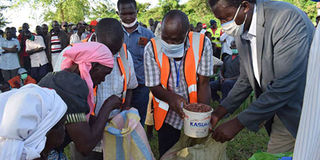Saboteurs, profiteers negating on gains made in Covid-19 war

Homa Bay County officials distribute relief food to vulnerable households at Kamato Primary School in Suba on May 21, 2020. PHOTO | GEORGE ODIWUOR | NATION MEDIA GROUP
What you need to know:
- Let the authorities also go for economic saboteurs who refuse to effect the executive directive on tax relief.
- Traders should realise that the pandemic has worsened the economic situation of many households, with many breadwinners having to contend with pay cuts, unpaid leave or even loss of gainful employment.
The Covid-19 pandemic has emerged as the defining global health crisis of our time.
As it spreads exponentially, the disease has had an unprecedented impact on almost all economic sectors.
The strain on governments is extreme and the impact on the people continues to grow. To arrest the spread of the coronavirus, Kenya’s introduced stern containment measures.
The pandemic also has the potential to create devastating social, economic and political crisis with far-reaching consequences. But as cases increase, there is solace in the fact that the government has stepped up response efforts.
However, it is in disaster response and relief efforts that the values of open government can come under intense pressure, though it can also meaningfully contribute to better outcomes.
But as the government, partnering with other local and global players, steps up efforts to combat the pandemic, it is worrying that these are being negated by saboteurs and profiteers.
The public enemies slowing down the fight against Covid-19 are not only those breaking the curfew but economic saboteurs who do not implement government directives.
Besides arresting curfew breachers and mask defaulters, let the authorities also go for economic saboteurs who refuse to effect the executive directive on tax relief.
Almost four weeks after President Uhuru Kenyatta announced two per cent VAT reduction on essential commodities, the prices at many retail outlets are unchanged.
TAX BREAKS
The prices of milk, bread and sugar, for instance, are either the old ones or have been increased. Why is milk still retailing at Sh50-plus yet the authorities do not go after the retailers with as much zeal as they do drunkards who are locked up in bars?
What interventions are Kepsa, FKE and Cofek, among other stakeholders, doing to point out these gaps?
While I appreciate that Kepsa has been visible in this area, prescribing measures to mitigate the impact of the pandemic, it is my humble opinion that some of these once-vibrant bodies have failed in their cardinal duty.
It is encouraging to hear that the Kepsa Covid-19 Business Response Committee seeks to gather disaggregated information from all sectors the impact of Covid-19 on them and the effects of the interventions by the public and private sectors to safeguard businesses and jobs during and after the pandemic.
The United Kingdom, for instance, has, for the next three months, waived VAT. The British ministry of trade and commerce offered compensations to employers for salary payments to retained employees.
These are progressive policies. When you cushion employers from the hardships of Covid-19, families and communities will, in turn, not feel the heat.
Apparently, though sad indeed, the coronavirus crisis has revealed the ‘true’ public servants. Maybe a regulation for organisations or institutions to pay suppliers within 60 days is needed now more than ever.
PENDING BILLS
This is beyond the President’s commendable call for government entities to clear pending bills. It seems few are paying for goods or services procured in the past two months.
I know of customers who, taking advantage of the virus, have written to service and goods providers, claiming that they cannot pay for them or are closing shop and hence scaling down on consumption. That has the implication of job losses.
Consumer regulatory agencies have failed Kenyans during the pandemic. Since the announcement of the first confirmed case of the Covid-19 in Kenya, uncertainty descended upon consumers, sparking panic buying of commodities — ranging from essential foodstuffs to protective gear, such face masks, gloves, hand sanitisers and toiletries.
Traders should realise that the pandemic has worsened the economic situation of many households, with many breadwinners having to contend with pay cuts, unpaid leave or even loss of gainful employment.
Kenyans should condemn such heartless businesses dancing on the graves of helpless consumers.
Mr Masava is a communication specialist. [email protected].




